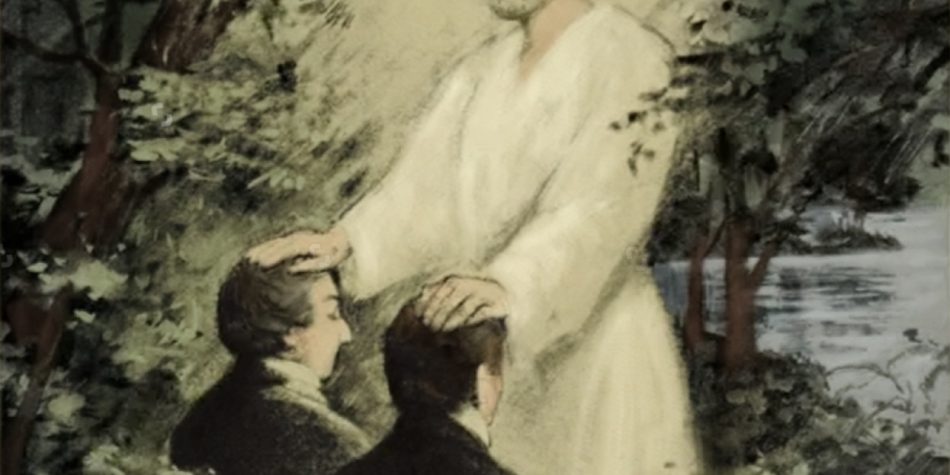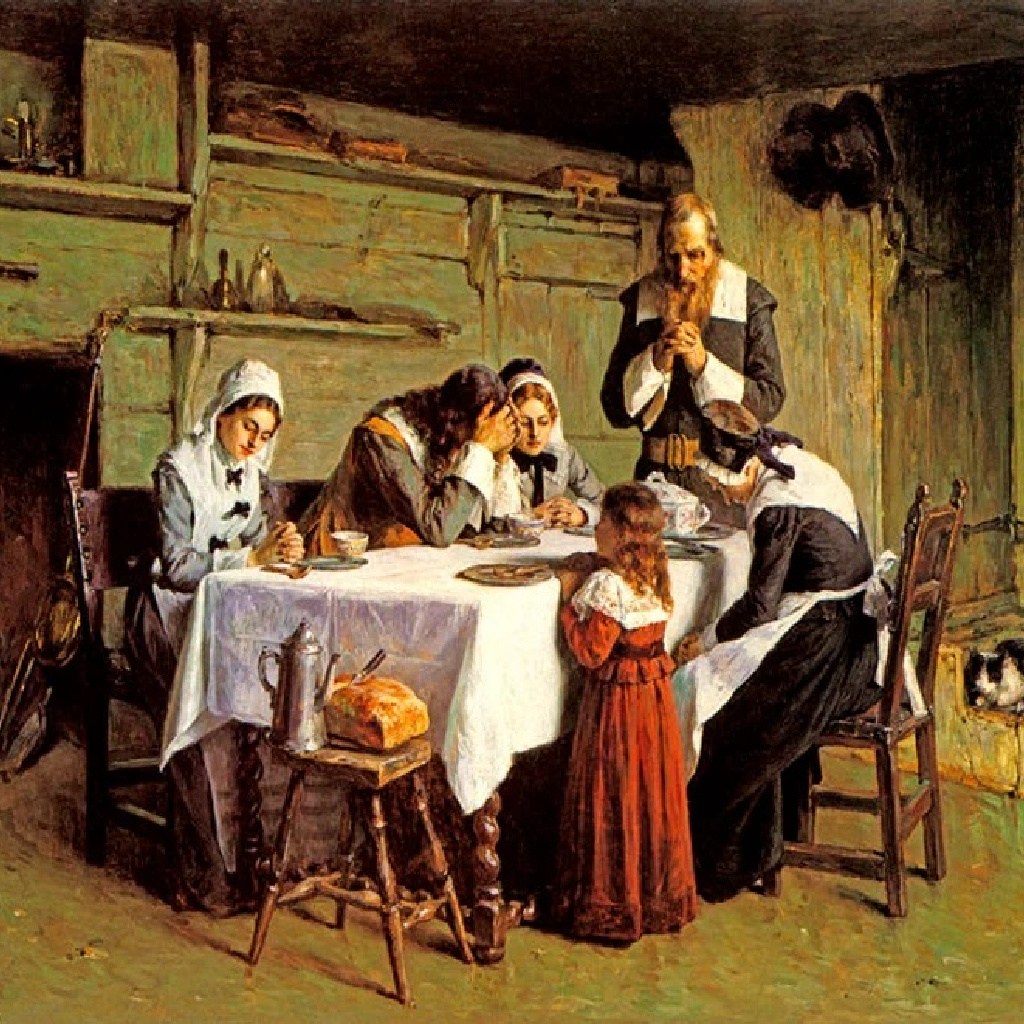Oliver Cowdery and Joseph Smith, two key leaders in the early days of the Latter-day Saint movement, had a significant disagreement in the summer of 1830. Oliver objected to the requirement in the “Articles and Covenants” (now a part of Latter-day Saint scripture) that those seeking baptism “truly manifest by their works that they have received the gift of Christ unto the remission of their sins.” Cowdery wrote to Joseph, “I command you in the name of God to erase those words, that no priestcraft be among us.” The sentence troubled Oliver because it was not found in the Book of Mormon or in the “Articles of the Church of Christ” (a precursor to Joseph’s “Articles and Covenants”) that he was commanded to write a year prior.
Joseph’s rejoinder to Oliver was to ask “by what authority he took upon him to command me to alter, or erase, to add or diminish to or from a revelation or commandment from Almighty God.” Joseph then made the 300-mile journey from Harmony, Pennsylvania, to Fayette, New York, to convince Oliver and others who believed as he did that they were in error. Joseph later wrote that “it was not without both labor and perseverance” that he was able to “prevail with any of them to reason calmly on the subject.” By September 26, Joseph had, with the help of one other person, persuaded Oliver to accept his view. On that day, the “Articles and Covenants” Oliver criticized were ratified at a church conference and Oliver himself read them aloud.
This is a striking, candid picture of the sometimes-chaotic realities of human relationships. Latter-day Saints hearing this story for the first time will likely be surprised. We are not accustomed to hearing of disagreement among our leaders. So, thank you Joseph Smith Papers! We need reminders that disagreements—even sharp ones such as this—are a natural part of life, even for the holy men and women we honor as faith leaders. They disagree precisely because they care that much about getting it right in the realm of eternal, ultimate things.
I recently thought of the importance of this when I saw a fellow Latter-day Saint send out this tweet: “Today in Elders Quorum, I started a sentence with ‘I’m not sure Alma is right.’ One guy actually raised his voice and said, ‘THE BOOK OF MORMON IS TRUE. THERE IS NO ROOM FOR DEBATE. NOT IN THIS QUORUM.’ It was messy.”
This is sad, but not surprising. Many of my wonderful fellow Saints, for all their many strengths, are not equipped to respond productively to such comments. Our church is nearly 200 years old, but our collective intellectual tradition is still in its infancy. We are still sometimes more comfortable engaging in soft-toss discussions. These are encouraged by church-produced materials designed, understandably, to help a global audience with varying levels of education. We are also more comfortable speaking of certainties and we too rarely have the capacity or the courage for the hardball of questioning things we think we already know.
This is strange, even bewildering, when you consider that The Church of Jesus Christ of Latter-day Saints has a doctrinal foundation better equipped to welcome rigorous discussion than probably any other faith on the planet. Just think of this: Joseph Smith said the “fundamental principles of our religion are the testimony of the Apostles and Prophets, concerning Jesus Christ, that He died, was buried, and rose again the third day, and ascended into heaven; and all other things which pertain to our religion are only appendages to it” (emphasis added). Outside of the core doctrine of the life and teachings of Jesus Christ, the Latter-day Saints must be open to questioning and reconsidering everything. We believe God “will yet reveal many great and important things pertaining to the Kingdom of God” (emphasis added).
Is our chief concern winning the debate or pursuing the truth, no matter where truth leads us?
We are surrounded by excellent models of mastering the delicate art of disagreement. Nearly three decades ago, Elder Dallin H. Oaks, an apostle of The Church of Jesus Christ of Latter-day Saints, described how his apostolic colleagues effectively avoided contention. “They are not always in agreement,” President Oaks said, “but they are always in harmony. They are not uniform in opinions, but they are united in effort. They are many, but they are one.”
And how do they do this? He elaborated in 2017 during a training for Church employees. “Reconciling a difference may come, as I’ve often experienced it coming, in a discussion in which the Spirit of the Lord settles upon us, and we all come to one point of view, and I give up the point that I brought into the meeting and come into harmony with someone else’s point that I earlier disagreed with,” Elder Oaks said.
He then clarified, helpfully, that it’s not always so simple. “Sometimes it happens by saying, ‘Well, I still don’t agree with what my leader is proposing or the majority is proposing, but harmony and reconciliation is more important than any single issue.’ And so I’ll just trust in the Lord to correct this thing if it’s not right. I’ll be patient and humble, waiting for Him to correct that or me. It always happens one way or the other” (emphasis added).
The problem of conflict resolution is by no means unique to the Latter-day Saints. Take James Calvin Davis, an author and Presbyterian minister in Vermont. He says faith communities play an essential role in improving public life. But one question he repeatedly hears as he meets with religious groups around the United States shows that many are struggling with internal conflict resolution. “How are we supposed to provide a template and resources for respectful dialogue,” they ask, “when our own church debates are so often rancorous, divisive, and destructive?”
Davis points to Christian forbearance as a reliable solution. “God acted to extend forbearance to us, to pass over—that is, to refuse to respond negatively to—our sins, instead extending righteousness and patience to us in an act of grace and love embodied in Jesus Christ.” We must therefore extend the grace Christ bestows on us to each other. We should be patient with those we perceive to be weak or wrong, he says, “pushing their growth gently, sometimes swallowing our disagreements, seeking not our self-interest but the building up of others. For the forbearance we practice in a season of disagreement is a reflection of our gratitude for—and an extension of—the forbearance God in Christ shows us in the face of our alienation.”
Granted, these approaches will not satisfy those with an insatiable appetite for the blood sport of winning arguments while yielding no ground. But his comments are still worth considering. Elder Oaks and Mr. Davis show us that disagreements are not zero-sum games. In the pursuit of truth and wholeness, someone else “winning” does not mean we are losers. Virtuous cycles of dialogue are always possible, allowing both parties to be edified and rejoice together (see Doctrine & Covenants 50:22).
When we devote our lives to a cosmic cause as Oliver and Joseph did two centuries ago or as President Oaks and fellow Christians do today, disagreements are inevitable. We have different bodies and minds and backgrounds. We care deeply about doing the right thing. Can we muster the humility of mind to consider other views? Will we give room in our hearts for the forbearance of Christ? Is our chief concern winning the debate or pursuing the truth, no matter where truth leads us?
For followers of the meek Man who claims to be “the way, the truth, and the life,” the path to choose should perhaps be obvious.
















